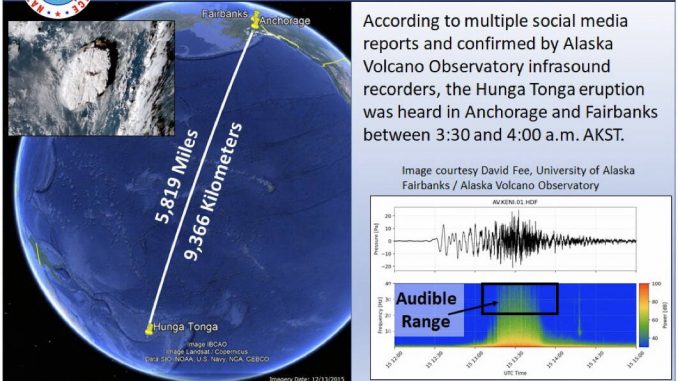
By: Lawrie Crawford, Local Journalism Initiative Reporter, Yukon News
Travelling at more than 1,000 km/hour, two atmospheric pressure waves from the Hunga-Tonga-Hunga-Ha’apai volcanic eruption traveled completely around the world, spreading huge sonic wave sounds over Yukon and Alaska as they went past on the morning of Jan. 15.
“Big earthquakes cause the solid earth to ring like a bell… Looks like the Tonga eruption rang the atmosphere,” tweeted Susan Hough, a scientist in the Earthquake Hazards Program with the USGS (United States Geological Services).
Loud rumbling sounds woke some Yukoners out of their beds, as the fluid atmosphere rippled with reverberations from a powerful volcanic eruption over 9,000 kilometres away, waves bounced between mountains and the distant vibration sounds became audible.
At first, Edwin Nissen, who is head of the School of Earth and Ocean Sciences at the University of Victoria, didn’t believe it was possible that people in Carcross or Haines Junction actually heard sounds from the volcanic eruption.
Nissen was talking to the News about 3 hours after the sounds had echoed between Yukon mountaintops and puzzled Yukoners had taken to social media.
“It would be incredible if that’s what people were hearing. And to me, that sounds almost, almost unbelievable,” Nissen said.
Nissen stayed on the phone as he analyzed more data arriving on his computers, checked his Twitter feed and compared time stamps.
His tone shifted. “I have to admit the timing is about right, and it could be that behind the initial pressure waves there were some reverberations, you know, the atmosphere is a fluid,” he said, and paused.
He kept looking at the graphs of the pressure waves until he found signal within the audible range.
“It’s incredible,” Nissen said.
“I think people may have actually have heard a pressure wave from a very, very large volcanic eruption.”
Confirmation came in a tweet from the University of Fairbanks. The Geophysical Institute’s infrasound measurements found the sounds were in the audible range and confirmed that people in Anchorage, Homer and Fairbanks had heard them as well.
“So crazy it’s wrinkling my brain,” another seismologist tweeted.
This should make Yukoners who were questioning their sanity on Saturday morning a lot more comfortable.
But the eruption, as amazing as it was scientifically, is devastating for the Tongan islands — covering the islands with ash, flooding low-lying areas with high water from tsunamis and severing the underground cable between Tonga and Fiji, blacking out communications with the rest of the world.
Math’ieya Alatini, a Yukon resident, thinks her husband may be one of only two people from Tonga in the territory. She said it was so hard when the news first broke, but word came in through a satellite link on Sunday that her husband’s family was safe.
“They live in a coastal community that was not hard hit, but when it was happening, the volcanic ash that’s falling and coating everything,” she said, adding that the not-knowing causes more anxiety than anything.
“It’s good that New Zealand is keeping track. We can listen to the news in New Zealand because they are reporting pretty consistently what is happening.”
Alatini said that the main town on the larger island, with banks and shopping, was hardest hit with the waves, flooding and ash. Fresh water supplies are a big concern.
“The family in Tonga are quite self-sufficient — they are out fishing every morning. But if we felt shockwaves, what about the animals? The fish?”
Approximately 200,000 lightning events struck near Tonga in the first hour of the eruption. The ash spread 260 km across and rose 30 km high. Two pressure waves circled the globe causing long and loud rumbling sounds in the Yukon and Alaska, tsunamis in the Pacific and the Caribbean, and affected the lives of a family in Burwash Landing.
A tweet from the British weather hub totted it up: “Our atmosphere acts as a fluid, like dropping a pebble in a still pond and seeing the ripples.”



Be the first to comment